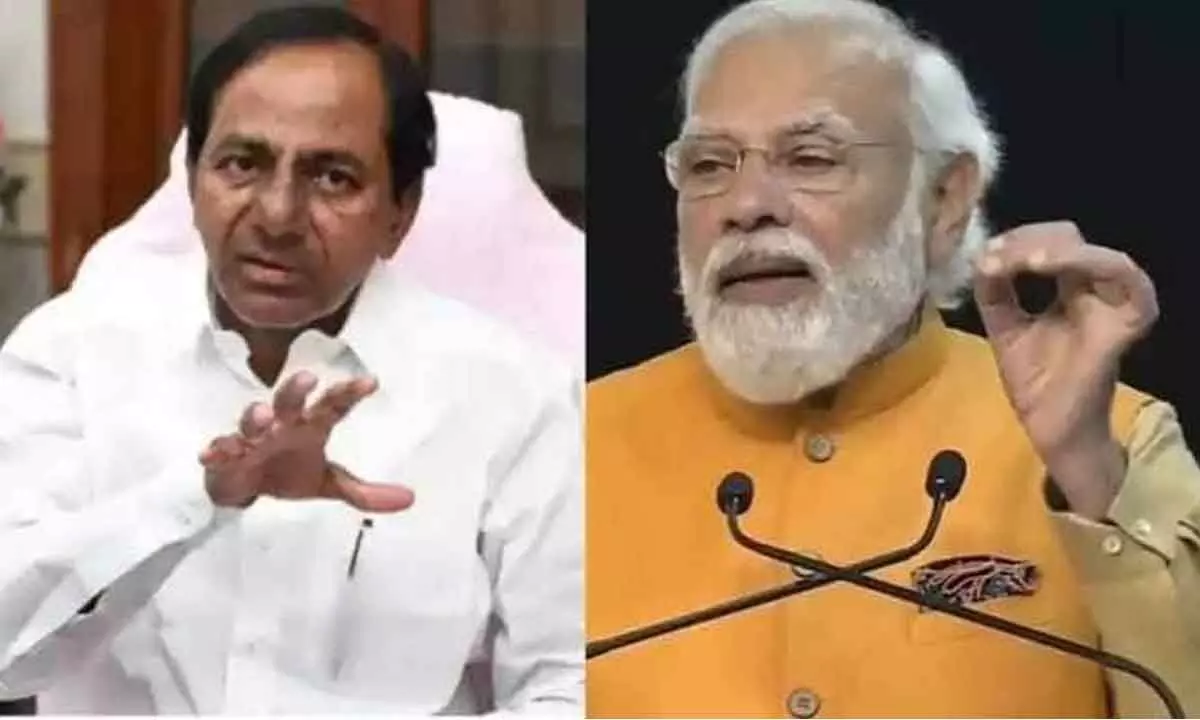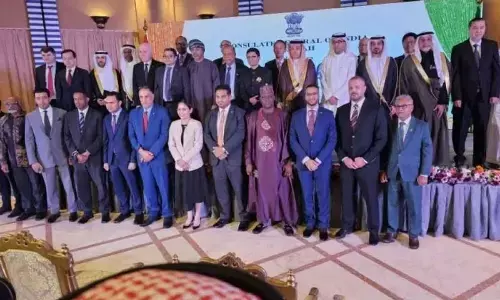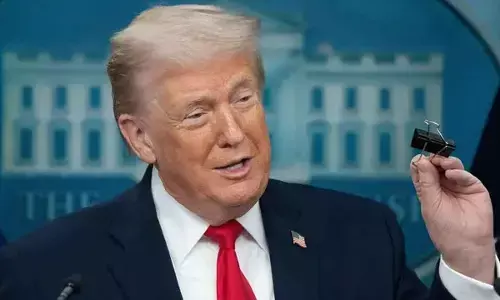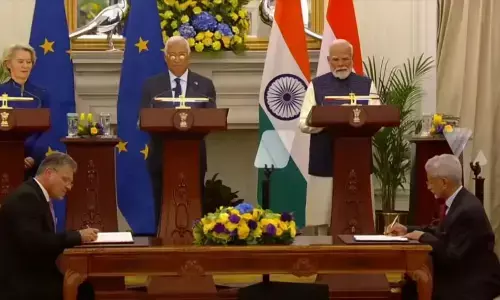It's time for resurgence of secular, democratic forces

According to media reports, Telangana Chief Minister K Chandrashekar Rao is busy drawing his strategy of launching a national party shortly. Some papers have also indicated date and time.
According to media reports, Telangana Chief Minister K Chandrashekar Rao is busy drawing his strategy of launching a national party shortly. Some papers have also indicated date and time. Whether the announcement comes now or little later, KCR has, time and again, been very critical of divisive politics and politics of concentration of power in the Center as pursued by the BJP government. Underscoring that secular and democratic thinking intellectuals are feeling very bad for this, KCR makes it clear that only people are supreme in a democracy like India.
KCR reminds how various democratic and Left forces came together under the leadership of Lok Nayak Jayaprakash Narayan (JP) to trounce the dictator ruler of the day and came to power in just 40-50 days, stressing the need for a similar movement. Arrogance on the part of BJP will no more be tolerated, he warns, citing the downfalls of dictators such as Hitler, Mussolini and Napoleon. He also predicts that BJP will be ousted from power within next 18 months. The inference is another JP in the form of KCR is in the offing with his alternative agenda.
When the very existence of democracy, secularism, pluralistic society, socialist pattern, peace and harmony of this great country are at stake, people often ask what would happen next. For all those prophets of doom and pessimists, there is nothing to get worried or agitated about. The beauty of Indian democracy, the largest in the world and perhaps one and only country that won freedom from colonial rule and sustained democracy, lies in its course correction. Like the proverbial Phoenix, India as a democratic entity has the ability with right leadership to correct itself and move forward with no regrets. This is exactly where people are looking to KCR and for the right time for launching his national party.
In Post-Independence Indian politics and governance, people by and large got accustomed to a level of tolerance. When the limits are exceeded by the party or leader at the helm of affairs, be it in the form of exhibiting dictatorial tendencies or moving towards extreme left or right, or signs of instability, alternative leadership automatically emerged. When Indira Gandhi got rid of syndicate, the earliest seeds of right-wing domination in her own party; when she herself turned dictatorial, and was trounced by a combination of left-right combination led by Jayaprakash Narayan; when unstable Janata government was defeated by Indira; when NT Rama Rao-powered National Front defeated Rajiv Gandhi who got involved in corruption charges like Bofors and VP Singh becoming Prime Minister; this was proved beyond doubt. The repetition of either Congress-led UPA or BJP-led NDA forming governments alternately at the Center needs to be done away with.
Pandit Jawaharlal Nehru, the first Prime Minister who commanded the respect of persons of diverse ideologies – left, right and moderate – was undeniably an ardent secular in appeal but conscientiously followed his religious beliefs. He never exhibited fanatism. Nehru believed in socialistic pattern of society and thus was at equi-distance from the capitalist and the communist ideologies and followed the tolerant midway ideologue. That was how the journey of parliamentary democracy with secular and socialistic spirit commenced in India 75 years ago. Lal bahadur Shastri succeeded Nehru and was in office for just 19 months. With the slogan of 'Jai Jawan-Jai Kisan', he broke Pakistan's arrogance forever in the 1965 war.
Indira Gandhi succeeded Shastri amidst expectations of Syndicate wing of Congress party, who were bye and large followers of right-wing ideology, that they can control her remotely. Initially, she too played their game. Her support to VV Giri, against the official Congress party candidate Neelam Sanjiva Reddy, in the Presidential Election in 1969, was the major turning point in Indian politics. The divisive forces were fought successfully for the first time by Indira Gandhi. Her progressive decisions such as bank nationalization led to her expulsion and split in the party.
President Giri dissolved Lok Sabha and elections were held in March 1971 and Indira Gandhi won against the Grand Alliance represented by anti-progressive, anti-democratic and divisive forces, a pre-poll alliance with SSP, PSP, the Swatantra Party and Bharatiya Jana Sangh. Following Allahabad High Court historical judgment and Supreme Court's partial stay, Indira Gandhi riding high over her popularity imposed emergency and got arrested many opposition leaders. To fight the dictatorial arrogance of Indira Gandhi, people rose to the occasion and leadership came in the form of Jayaprakash Narayan (JP). Indira lost power in the elections held two years after imposition of emergency. Extreme rightwing Jana Sangh to the extreme left parties came under one umbrella. Morarji Desai became the Prime Minister.
Janata coalition headed by Morarji Desai, which included right wing Hindu Nationalists with loyalties to RSS, was united mainly by its hatred of Indira Gandhi rather than fighting dictatorial tendencies. The government lost majority due to infighting and Charan Singh replaced him. In the subsequent elections, Indira Gandhi swept back into power with the slogan of 'vote for stability.' People preferred Indira to right-wing Hindu nationalists and unstable governments.
Rajiv Gandhi succeeded Indira and in the elections that followed he won the largest majority in history. After five years, he was defeated by National Front, an opposition coalition headed by NT Rama Rao. VP Singh who uncovered political corruption of Rajiv became the Prime Minister. BJP and left parties extended outside support but BJP withdrew after a few months over the Ram temple issue causing its collapse. Chandrashekhar succeeded VP Singh.
After Rajiv Gandhi's assassination amidst election campaign, in May 1991, PV Narasimha Rao succeeded Chandrashekhar as the Prime Minister after the general elections in June. Rao began efforts to restructure India's economy from day one. His years as Prime Minister saw the emergence of the Bharatiya Janata Party (BJP) as an alternative to Congress.
Atal Bihari Vajpayee of BJP became the Prime Minister of India thrice. Between Vajpayee's first and second terms, there were two unstable United Front governments headed by HD Devegowda and IK Gujral for less than two years put together. Vajpayee was the first Indian Prime Minister not of the Indian National Congress to serve a full term in office.
In 2004 elections Congress led by Sonia Gandhi emerged as the single largest party and formed the United Progressive Alliance. The UPA, with the outside support of Communist Parties, formed the next government headed by Manmohan Singh. The 2009 general election saw the UPA return with an increased mandate, with Singh continuing as the Prime Minister.
In the 2014 elections, Narendra Modi led the BJP to victory and won a majority of seats on its own and became Prime Minister. Second time he became the Prime Minister following his party's and NDA's grand victory in 2019 elections. However, as the years passed, Modi is being criticised for centralising power and belittling cooperative federalism and thereby systematically eroding federal structure. He controversially initiated demonetisation of high-denomination banknotes and farm laws. Modi remains a figure of controversy for his Hindu nationalist beliefs, democratic relapsing, bulldozing every institution, undermining basic rights of democracy and weakening secular fabric of the nation, besides ruthlessly, arrogantly and unethically trying to silence the opposition, immorally and illegally toppling the democratically elected state governments.
KCR's proposed national party seems to be fully gearing up to shoulder the responsibility and take lead to enlist the support of non-Congress, non-BJP parties for 'BJP-Mukt Bharat' to protect the country from the harmful divisive forces and to restore the country back to its glorious past of secularist traditions and commitment to diversity. It also will be the beginning to lay a strong foundation for the country to once again stand tall with true democratic and secular values and become an economic power in Asia as well as in the world.

















